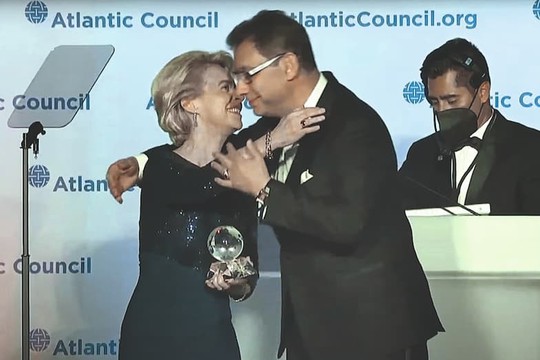Happy together – Ursula von der Leyen with Pfizer CEO Albert Bourla.
1.8 billion euros from the EU budget went to pay for Pfizer vaccines.
Photo: Valeurs Actuelles
Ursula von der Leyen's legacy as European Commission president will face a huge challenge this week when the EU court rules on secret text messages she exchanged with the boss of a drug company that agreed a multibillion-euro vaccine deal with Brussels, POLITICO writes.
In what's set to be a reputation-defining judgment, the Court of Justice of the EU will decide whether by refusing to release the contents of her text conversation with Pfizer CEO Albert Bourla the Commission breached transparency rules.
Not only will Wednesday's "Pfizergate" decision in the lower-tier General Court have sweeping implications for how the bloc's top officials conduct business behind closed doors, it could also cast a shadow over von der Leyen's second five-year term at the helm, which only started on Dec. 1. As she battles to keep the Commission relevant amid nationalist rhetoric growing around the bloc, she has already attracted criticism for her tendency to centralize power and for rowing back on green-friendly commitments.
The nub of the issue is whether text messages should be classed as documents and therefore eligible to be published in the name of transparency. While campaigners and many external observers say they should be treated just like any other means of official communication when related to policymaking, the Commission says not.
The case is legally tricky for von der Leyen because she not only personally signed off on the bloc’s largest vaccine contract — worth billions of euros — she also presides over the very institution tasked with enforcing EU law, which includes principles of transparency and accountability. If the court rules against her, it would provide political ammunition to a wide range of critics.
It would also be a major embarrassment given it's just a few months after she publicly pledged to defend standards of transparency, efficiency and probity in her second term.
“This court ruling could mark a turning point for transparency in the EU,” said Shari Hinds, EU policy officer for political integrity at the NGO Transparency International. “When it comes to key decisions, particularly those affecting public health, secrecy should be avoided.”
The case was instigated by The New York Times and its former Brussels bureau chief, which brought an action against the Commission’s decision not to release the text messages in 2022.
The existence of the messages was revealed in an April 2021 New York Times interview, where Bourla described their exchanges as fostering “deep trust” and facilitating the negotiation of a substantial vaccine deal. This agreement, finalized in May 2021, involved the EU committing to purchase up to 1.8 billion doses of the Pfizer-BioNTech Covid-19 vaccine, the largest by far of all the deals signed by Brussels.
It foresaw the up-front purchase of 900 million doses, with the option to order 900 million more, for delivery in 2022 and 2023.
The European Ombudsman found in 2022 that the Commission’s failure to look for the text messages in question amounted to maladministration. Emily O’Reilly, ombudsman from 2013-2025 called it a “wake-up call” for the EU institutions.
She said transparency had gone backward under von der Leyen’s reign.
And she took particular aim at von der Leyen herself, accusing the Commission president in an interview with POLITICO last year of creating a culture of “holding things back” for political reasons.
She also criticized von der Leyen’s absence from the only court hearing held in the case so far. “The elephant who wasn’t in the room,” she said. “The one person who could tell us everything wasn’t there.”
In a statement to POLITICO, the Commission said that it “does not comment on ongoing legal procedures.”
Tilly Metz, one of the five Green members of the European Parliament to bring that case to the General Court, questioned who or what was behind von der Leyen’s reluctance to share information. “She gets bad advice there,” she said. “If you want the public to be confident and trust the politicians and what they do — and the contacts they do with industry — you have to put the focus on transparency.”
While she acknowledged that the Covid-19 health crisis was a “very new situation” that led to the Commission having to collaborate with industry, she believes that von der Leyen failed to learn the right lessons from the pandemic.
The pressure on von der Leyen is mounting beyond this ruling. The European Public Prosecutor’s Office, tasked with investigating serious financial crimes against the EU’s financial interests, confirmed that it has been investigating the Commission on its handling of the vaccine procurements.
…Europe's second-top court on Wednesday dismissed the European Commission's rejection of a New York Times' request to access text messages between its President Ursula von der Leyen and Pfizer CEO Albert Bourla on the purchase of billions of euros of COVID-19 vaccines, Reuter reports.
It means that the case will be investigated to the end. The reputation of the head of the European Commission is directly linked to corruption. The court will go further.
The New York Times said the messages between Jan. 1, 2021 and May 11, 2022 at the height of the pandemic could shed light on the billion-euro vaccine deals.
The Commission had turned down its request, saying von der Leyen had not kept the messages. That prompted the newspaper's lawsuit against the EU executive.
read more in our Telegram-channel https://t.me/The_International_Affairs

 11:26 14.05.2025 •
11:26 14.05.2025 •























